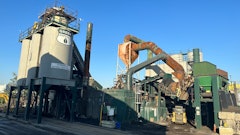
In the asphalt pavement industry, accurate moisture measurement is vital to producing and laying down a durable, quality surface at all stages of the process, whether for the construction of roads, streets, highways, parking lots, and airports or environmental and recreational facilities. The reason is that most asphalt mixes contain petroleum additives and water, and the ratio of moisture to solids is critical to the curing process.
To pave roads and parking lots, hot mix asphalt (HMA) is widely used because it hardens quickly and provides good traction. HMA is a combination of approximately 95% stone, sand, or gravel that is bound together by asphalt cement (a product of crude oil). HMA is typically mixed at an asphalt plant before transportation to the site by truck or rail car. Then operators dump the mix into hoppers and then dispense where needed before heavy rollers compact it.
During this journey, the moisture content can vary due to environmental conditions or water vapor loss as the HMA mix is heated, stored, and dispensed at temperatures up to 350° Fahrenheit. This variability can be disastrous to the quality, finish, longevity, and even safety of the finished asphalt.
To ensure the moisture content remains consistent, operators would ideally test the moisture content at every step of the way. Unfortunately, moisture measurement tests are rarely or inconsistently conducted. In addition, many moisture meters require calibration, sampling, and time. Many of the tools are not portable or durable enough to be used on heavy construction job sites.
Now with the availability of cost-effective, automated, and instant moisture measurement devices, the industry is turning to these options to ensure optimal moisture levels from the plant to the paving site to dramatically improve their outcomes.
“Asphalt producers are beginning to understand that the cliché ‘you can’t expect what you don’t inspect’ applies to moisture measurement. And with new, more accurate, easy-to-use, real-time moisture measurement devices they can improve asphalt quality and longevity by adjusting the mixture at any step from the plant to the ground,” says John Bogart, Managing Director of Kett US, a manufacturer of a full range of moisture and organic composition analyzers.
Ensuring Critical Moisture Levels
According to Bogart, one traditional approach to test for moisture content involves Loss on Drying testing. This uses a moisture balance to measure the total change in the material weight change of a mixture after drying. However, such tests typically require technicians to prepare a sample to be brought to a lab. Each test takes upward of 15 minutes to several hours to perform.
“Another challenge with moisture balances is that there is a limit to the weight of the sample you can place in one, which can be an issue with asphalt. Larger samples require a big drying oven, a big pan, and often overnight drying,” says Bogart.
To ensure consistent moisture content at HMA plants, the industry now uses Near-Infrared (NIR) light equipment for a highly accurate, non-contact, secondary-measurement method that delivers immediate, laboratory-quality moisture readings.
“NIR moisture meters allow very accurate instant measurement of solids, slurries, and liquids without contact or sample preparation and come in desktop, handheld portable, and inline models,” says Bogart. “When integrated with data collection and analysis software, inconsistencies can be quickly detected and corrected.”
For real-time testing of HMA, either during plant processing or dispensed to and from trucks or rail cars, inline tools can be used for 100% inspection of all mixed materials without having to take samples offline for testing. Moisture analyzers, such as Kett’s KB30, provide an instant, non-contact, non-destructive measurement of liquids and solids while the product is moving. The unit’s small form factor allows for simple placement when updating or retrofitting existing process lines.
For frequent spot checks of various materials anywhere in the process, operators can use portable, handheld, and instant moisture meters. The design of these types of units allow them to be used wherever necessary on both stationary and moving materials, including those on a process line. The user simply points the instrument at the material and the moisture content is instantly shown on a digital display, with results accurate to .01% in a 0-100% measurement range. Desktop NIR Moisture Analyzers, like the KB230, display results immediately, and are suitable for jobsites that need continuous sample measurements.
Once technicians lay the asphalt, these handeld meters can instantly measure not only the road surface but also sublayer moisture to ensure proper curing.
For asphalt producers or contractors that also want to analyze the composition of the mix, NIR composition analyzers are available which can instantly verify the correct quantity of additives and binders, as well as recycled materials in the mix such as tire rubber, reclaimed asphalt pavement (RAP), asphalt shingles (RAS), slags, glass, and even pig manure.
“As recycled materials become a larger percentage of the inputs for asphalt production, composition analyzers will also play a role,” says Bogart.
For those in the industry who may be less familiar with moisture measurement, or previously considered it impractical, Bogart points out that recent advancements now make it quite affordable.
“It is a misconception that moisture measurement [of asphalt and pavement products] is difficult or costly today. Automated inline moisture measurement for the plant or haul truck, for example, costs as little as $10 per business day on lease for 100% inspection of all materials and can free an operator from spot checking to perform other higher-value tasks. Compare that to paying an hourly rate to an employee to do occasional spot checks of small amounts of material,” says Bogart.
As the asphalt industry strives to improve the bottom line, a growing number of professionals will utilize automated, instant moisture testing and composition analysis to promote superior quality and performance, which ultimately translate into greater profitability.
























